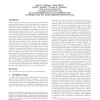103 search results - page 19 / 21 » Knowledge transfer for cross domain learning to rank |
112
click to vote
AAAI
2012
13 years 1 months ago
2012
The study of transportability aims to identify conditions under which causal information learned from experiments can be reused in a different environment where only passive obser...
CVPR
2010
IEEE
15 years 7 months ago
2010
IEEE
For object category recognition to scale beyond a small number of classes, it is important that algorithms be able to learn from a small amount of labeled data per additional clas...
EMNLP
2008
15 years 15 days ago
2008
A human annotator can provide hints to a machine learner by highlighting contextual "rationales" for each of his or her annotations (Zaidan et al., 2007). How can one ex...
104
click to vote
CBRMD
2008
14 years 11 months ago
2008
Intelligent analysis of heterogeneous data and information sources for efficient decision support presents an interesting yet challenging task in clinical environments. This is par...
104
click to vote
KDD
2010
ACM
15 years 1 months ago
2010
ACM
Active learning (AL) is an increasingly popular strategy for mitigating the amount of labeled data required to train classifiers, thereby reducing annotator effort. We describe ...

